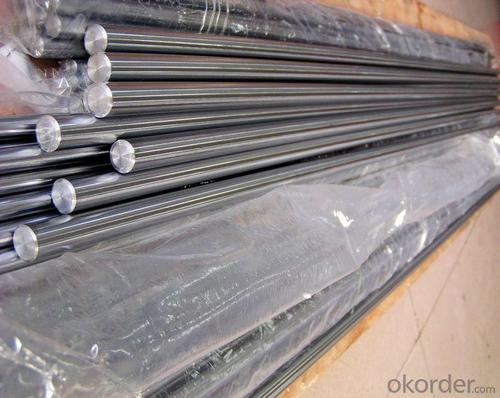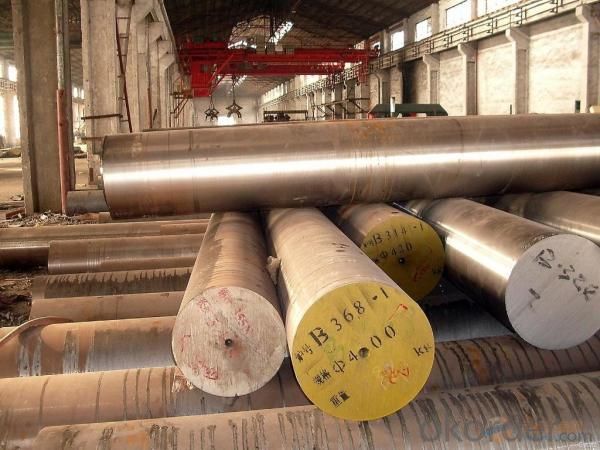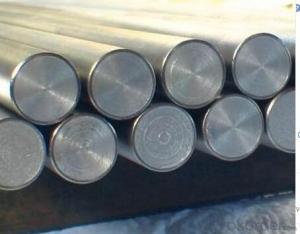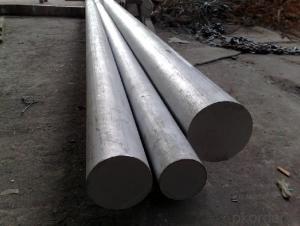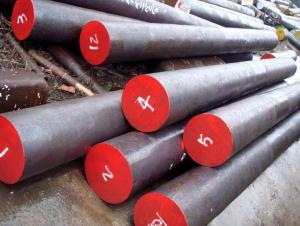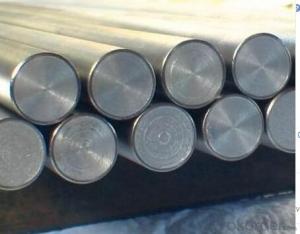Bearing Steel 100CrMnSi6 1.3520 GCr15
- Loading Port:
- China Main Port
- Payment Terms:
- TT or LC
- Min Order Qty:
- 20MT m.t.
- Supply Capability:
- 600000tons/year m.t./month
OKorder Service Pledge
OKorder Financial Service
You Might Also Like
Specifications of Bearing Steel 100CrMnSi6 1.3520 GCr15
1. Sizes:
Dia:150~650mm/12~250mm
Length: 4m~6m/2m~6m
2. Chemical Composition
GCr15 | C | Cr | Si | Mn | P | S | Ni | Cu | Mo |
Wt% | 0.95-1.05 | 1.40-1.65 | 0.15-0.35 | 0.25-0.45 | <0.027 | <0.02 | <0.23 | <0.25 | <0.1 |
GCr15 | Sn | As | Ti | Sb | Pb | O | Al | Ca | |
Wt% | <0.03 | <0.04 | <0.005 | <0.002 | <0.002 | <0.001 | <0.05 | <0.01 |
3. Processing: Hot- forged, EAF+LF+VD+Forged+Heat treatment (A,N,Q,T for optional)
Heat Treatment:
Soft annealing: heat to 680-720°C, cool slowly.
Hardness after annealing: Max. 241 HB
Hardening: 820 - 850 °C
Normalizing temperature: 840-880°C
Tempering: 540-680°C
Annealing: Heating to 790-810°C, furnace cool to 650°C, then cool in air |
Normalized: Heating to 900-920°C, cool in air |
High Temperature Tempered: Heating to 650-800°C, cool in air |
Quenched: Heating to 860°C, oil quenched |
Low Temperature Tempered: Heating to 150-170°C, cool in air |
4.Standard: DIN 100CrMnSi6 1.3520/ GB GCr15SiMn
5,Certificates: ISO9001 2000
6.Features:
Stable elements, low harmful elements, high-purity steel, evenly carbides, ewer surface defects;
using with wide range of plastic processing, heat treatment with stable quality, high and
evenly hardness, good wear resistance, high strength of contact fatigue; excellent cutting and process ability.
7. Payment terms: T/T or L/C at sight
Usage & Applications of Bearing Steel 100CrMnSi6 1.3520 GCr15
Our products have been used in all kinds of areas, such as aviation, aerospace, navigation, nuclear, energy, chemical industry, electronic information, petrochemical, automotive, instrument and meter, Communication ,transportation, and medical instruments, etc. Bearing ring,steel rolling mill ,machinery, 100Cr6 bearing steel ball is widely used in high-speed and low-noise bearing, bicycle, motorcycle, automobile, bags, electronics
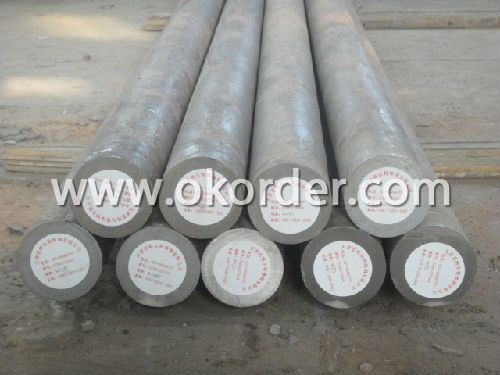
Packaging & Delivery of Bearing Steel 100CrMnSi6 1.3520 GCr15
Mark: Heat No. will be cold stamped and Steel grade, diameter (mm), length (mm), and the manufacturer LOGO and weight (kg) is painted.
Standard seaworthy packing or as customer required
Delivery time: Within 30 days after order is confirmed.
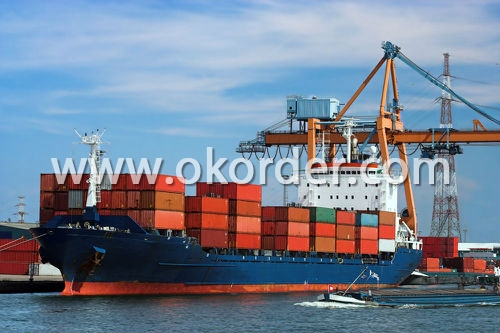
- Q: How does special steel contribute to the overall economy?
- There are multiple ways in which special steel contributes to the overall economy. To begin with, special steel finds extensive application in industries such as automotive, construction, energy, and machinery, among others. Its distinct properties and characteristics make it the preferred choice for producing high-performance and durable goods. The demand for special steel not only creates employment opportunities in the steel industry and related sectors but also fuels economic growth. Moreover, the production and export of special steel play a vital role in a country's export earnings, thereby enhancing its trade balance and overall economic performance. Several countries, including China, Japan, and Germany, have greatly benefited from the export of special steel products due to their thriving steel industries. Furthermore, the development and advancement of special steel technologies have a positive impact on innovation and research and development (R&D). Companies in the steel industry invest in R&D to enhance the properties and performance of special steel. This not only results in the creation of new and improved steel alloys but also drives innovation in other industries that rely on special steel products. Additionally, special steel plays a crucial role in infrastructure development as it is extensively used in the construction of bridges, buildings, pipelines, and other critical infrastructure projects. By incorporating special steel, these projects gain durability, safety, and longevity, leading to long-term cost savings. Consequently, this contributes to economic development by promoting sustainable and efficient infrastructure. Lastly, special steel also contributes to the overall economy by fostering a competitive manufacturing sector. Countries with a strong special steel industry possess a competitive advantage across various sectors, as they can manufacture high-quality products more efficiently. This attracts investment, stimulates industrial growth, and enhances overall productivity, ultimately leading to national economic prosperity. In conclusion, special steel contributes to the overall economy through its wide-ranging utilization in diverse industries, its impact on export earnings, its influence on innovation and R&D, its contribution to infrastructure development, and its ability to foster a competitive manufacturing sector.
- Q: What are the requirements for special steel used in pharmaceutical manufacturing?
- The pharmaceutical manufacturing industry demands stringent requirements for special steel. To guarantee the safety, purity, and effectiveness of the products, the steel must adhere to specific specifications and meet various criteria. Foremost, the steel used in pharmaceutical manufacturing must be of top-notch quality and possess exceptional corrosion resistance. This is vital to prevent any contamination or reaction with the pharmaceutical compounds or chemicals involved. It is imperative that the steel does not release any impurities that could compromise the purity of the final product. Additionally, the steel must be capable of withstanding high temperatures and pressures, as pharmaceutical manufacturing processes often involve heat treatment, sterilization, and other high-temperature operations. It is crucial that the steel maintains its structural integrity and does not affect the quality of the pharmaceutical products under these conditions. Another significant requirement for the steel used in pharmaceutical manufacturing is easy cleanability. The steel should have a smooth surface without any cracks, crevices, or rough areas that could trap bacteria, contaminants, or residues. This is essential to maintain the hygiene and sterility of the manufacturing environment and ensure that the pharmaceutical products meet the highest quality standards. Furthermore, the steel must comply with regulatory standards and industry guidelines. It should meet the specific requirements set by regulatory bodies such as the Food and Drug Administration (FDA) or the European Medicines Agency (EMA). These standards often include specifications regarding the composition, mechanical properties, and traceability of the steel. In conclusion, the requirements for special steel used in pharmaceutical manufacturing are strict and encompass factors such as top-notch quality, corrosion resistance, heat resistance, cleanability, and compliance with regulatory standards. Meeting these requirements is vital to guarantee the safety, purity, and effectiveness of the pharmaceutical products manufactured using this steel.
- Q: How does special steel ensure product traceability?
- Special steel ensures product traceability through the implementation of unique identification codes, comprehensive record-keeping systems, and advanced tracking technologies. These measures enable manufacturers to accurately track and trace the entire lifecycle of the steel, from raw materials to the finished product. This ensures that any issues or defects can be identified and addressed promptly, enhancing quality control and customer satisfaction.
- Q: What are the different electrical grades of special steel?
- There are several electrical grades of special steel that are specifically designed to have superior electrical properties. These grades include: 1. Electrical Silicon Steel: This grade of special steel contains a high percentage of silicon, typically around 3-4%. The presence of silicon helps to minimize eddy current losses and improve the magnetic properties of the steel, making it ideal for use in electrical transformers and motors. 2. Electrical Stainless Steel: This grade of special steel is made from stainless steel alloys, which are known for their excellent corrosion resistance. The electrical stainless steel has a low electrical resistivity and high thermal conductivity, making it suitable for electrical connectors, terminals, and other components that require good electrical conductivity and resistance to oxidation. 3. Electrical Tool Steel: Tool steels are commonly used in the manufacturing of various tools and dies. Some tool steels are specifically formulated to have improved electrical properties, including high electrical conductivity and resistance to heat. These grades are often used in the production of electrical contacts, switches, and other electrical components that require high wear resistance and good electrical performance. 4. Electrical Copper-Clad Steel: This grade of special steel is made by bonding a layer of copper to a steel core. The copper layer provides excellent electrical conductivity, while the steel core provides strength and durability. Electrical copper-clad steel is commonly used in applications where high electrical conductivity is required, such as in power transmission lines and grounding systems. Overall, the different electrical grades of special steel offer a range of electrical properties to meet the specific needs of various electrical applications. These grades are carefully engineered to provide optimal electrical performance, durability, and resistance to corrosion and wear.
- Q: How is special steel used in the manufacturing of bearings?
- Special steel is used in the manufacturing of bearings due to its high strength, durability, and resistance to wear and corrosion. This type of steel is specifically designed to withstand the demanding conditions and loads that bearings are subjected to. It is used to create the inner and outer rings, as well as the rolling elements, of the bearing, ensuring smooth operation and increased lifespan.
- Q: What are the main characteristics of tool steel forgings?
- The main characteristics of tool steel forgings include high hardness, excellent wear resistance, and good toughness. They also exhibit high strength and heat resistance, making them suitable for applications that require cutting, shaping, or forming materials. Tool steel forgings are known for their ability to hold a sharp edge and withstand heavy loads, making them ideal for manufacturing tools, dies, and molds.
- Q: How is free-cutting steel used in the production of precision components?
- Free-cutting steel is used in the production of precision components due to its enhanced machinability. This type of steel contains additives such as sulfur, lead, or bismuth, which help in breaking the chips during machining, resulting in improved cutting performance. This makes it easier for manufacturers to achieve high precision and accuracy when shaping and forming the steel into intricate components. Additionally, free-cutting steel reduces tool wear and increases production efficiency, making it a preferred choice in industries requiring precise and complex parts, such as automotive, aerospace, and medical.
- Q: What are the main characteristics of creep-resistant steel forgings?
- Creep-resistant steel forgings possess several key characteristics that make them suitable for high-temperature applications where the material is exposed to prolonged stress and heat. Firstly, creep-resistant steel forgings are known for their excellent resistance to creep deformation. Creep is the gradual deformation that occurs under constant load and elevated temperatures over an extended period. These forgings are designed to resist this deformation and maintain their shape and structural integrity, making them ideal for applications such as turbine blades, boiler components, and other high-temperature environments. Another important characteristic of creep-resistant steel forgings is their high strength. These forgings are manufactured using alloying elements like chromium, molybdenum, and vanadium, which enhance the material's tensile strength and provide excellent resistance to deformation and fracture under high-stress conditions. This strength is crucial in ensuring the forgings can withstand the demands of the application and perform reliably over time. Additionally, creep-resistant steel forgings exhibit good oxidation and corrosion resistance. The alloying elements provide a protective layer on the surface of the forgings, preventing oxidation and corrosion at high temperatures. This resistance is vital in preventing degradation of the material and maintaining its mechanical properties, even in harsh environments. Moreover, creep-resistant steel forgings offer excellent thermal stability. They can withstand extreme temperature variations without significant dimensional changes or loss of mechanical strength. This stability is crucial in applications where rapid heating and cooling cycles occur, ensuring the forgings can maintain their performance under challenging conditions. Furthermore, creep-resistant steel forgings have excellent fatigue resistance. Fatigue is the weakening of a material caused by cyclic loading, and it is particularly relevant in high-temperature applications due to the combination of stress and heat. These forgings are designed to withstand cyclic loading and maintain their mechanical properties, reducing the risk of fatigue failure and enhancing the overall reliability of the component. In summary, the main characteristics of creep-resistant steel forgings include resistance to creep deformation, high strength, good oxidation and corrosion resistance, thermal stability, and excellent fatigue resistance. These characteristics make creep-resistant steel forgings a reliable and durable choice for applications that require resistance to high temperatures, stress, and prolonged exposure to challenging environments.
- Q: How does the heat treatment process affect special steel?
- The heat treatment process greatly affects special steel by altering its microstructure, improving its mechanical properties, and enhancing its overall performance. The process involves heating the steel to a specific temperature and then cooling it at a controlled rate. This changes the steel's internal structure, making it stronger, more durable, and resistant to wear and corrosion. Additionally, heat treatment can modify the steel's hardness, toughness, and flexibility, making it suitable for specific applications such as cutting tools, automotive parts, or aerospace components.
- Q: What are the main factors affecting the fracture toughness of special steel?
- The fracture toughness of special steel can be affected by several key factors, encompassing: 1. Alloy composition: The fracture toughness of the steel can be greatly influenced by its specific chemical composition, including the type and amount of alloying elements. Elements like chromium, nickel, and molybdenum have the potential to enhance toughness by promoting the formation of fine-grained microstructures or improving the steel's ability to resist crack propagation. 2. Heat treatment: Determining the fracture toughness of the steel is heavily reliant on the temperature and duration of the heat treatment process, as well as the subsequent cooling. Proper heat treatment can refine the microstructure and eliminate any potential defects, thereby enhancing the steel's resistance to fracture. 3. Microstructure: The fracture toughness of the steel is profoundly impacted by its microstructure, encompassing grain size and distribution, phase composition, and the presence of inclusions. Generally, finer-grained structures exhibit higher toughness due to their improved resistance to crack propagation. 4. Existence of defects: The presence of defects, such as cracks, voids, or inclusions, within the steel can act as stress concentrators, ultimately diminishing its fracture toughness. These defects can initiate cracks and facilitate their propagation, ultimately leading to reduced toughness. 5. Temperature: Fracture toughness is contingent upon temperature, and the behavior of special steel can significantly vary at different temperature ranges. Some steels exhibit improved toughness at lower temperatures due to microstructural transformations, while others may experience decreased toughness at elevated temperatures due to material softening. 6. Loading conditions: The fracture toughness of special steel can also be impacted by the loading conditions, including the rate of loading or the presence of dynamic loading. Higher loading rates or dynamic loading can result in reduced toughness, as the steel may not have sufficient time to deform and absorb energy before fracturing. 7. Mechanical properties: The mechanical properties of the steel, such as strength, hardness, and ductility, can influence its fracture toughness. Higher strength and hardness can sometimes lead to decreased toughness, as the material becomes more brittle. However, a balance between strength and toughness can be achieved by carefully selecting the alloy composition and heat treatment parameters. In summary, the fracture toughness of special steel is determined by a complex interplay of various factors, including alloy composition, heat treatment, microstructure, defects, temperature, loading conditions, and mechanical properties. By optimizing these factors, the fracture toughness of special steel can be enhanced for specific applications.
1. Manufacturer Overview
| Location | Jiangsu, China |
| Year Established | 1990 |
| Annual Output Value | Above US$ 20 Million |
| Main Markets | Mid East; Eastern Europe; North America |
| Company Certifications |
2. Manufacturer Certificates
| a) Certification Name | |
| Range | |
| Reference | |
| Validity Period |
3. Manufacturer Capability
| a) Trade Capacity | |
| Nearest Port | Shanghai |
| Export Percentage | 20% - 30% |
| No.of Employees in Trade Department | 21-50 People |
| Language Spoken: | English; Chinese |
| b) Factory Information | |
| Factory Size: | Above 100,000 square meters |
| No. of Production Lines | 1 |
| Contract Manufacturing | OEM Service Offered; |
| Product Price Range | High; Average |
Send your message to us
Bearing Steel 100CrMnSi6 1.3520 GCr15
- Loading Port:
- China Main Port
- Payment Terms:
- TT or LC
- Min Order Qty:
- 20MT m.t.
- Supply Capability:
- 600000tons/year m.t./month
OKorder Service Pledge
OKorder Financial Service
Similar products
Hot products
Hot Searches
Related keywords



